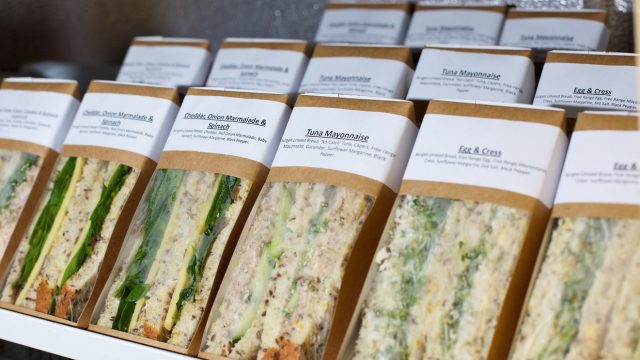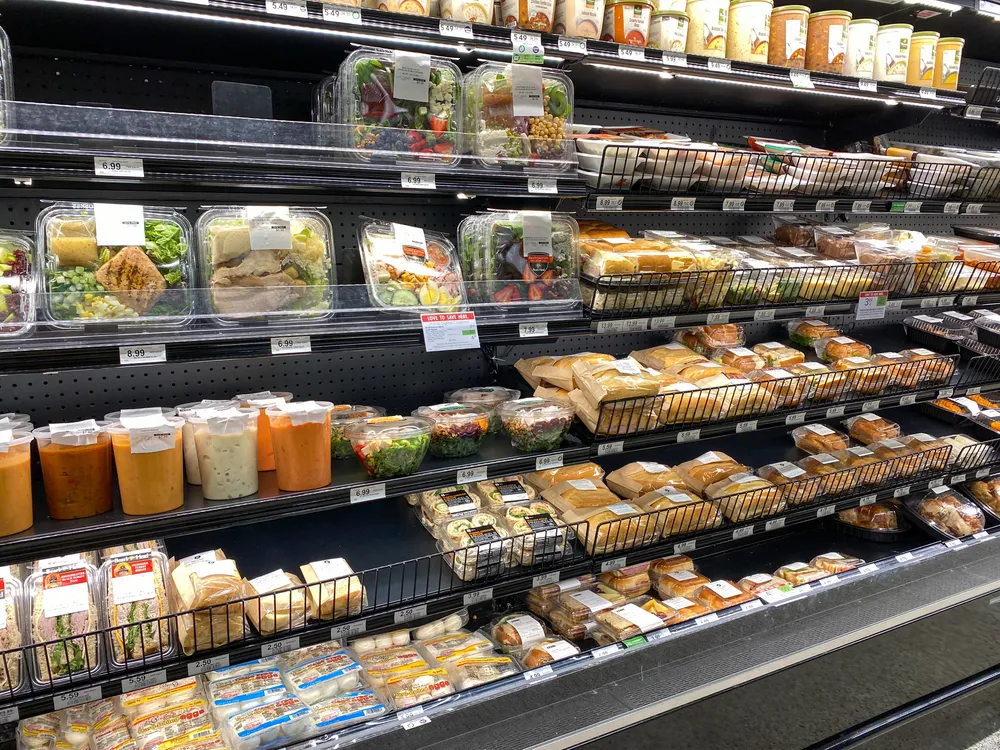Sandwiches, Yogurt, Muffins, and More Recalled Due to Possible Listeria, FDA Warns

We’ve all been in a situation where the prepared food section of a store has been a saving grace. Whether you’re trying to avoid missing breakfast or lunch due to a busy schedule, need a bite to eat while you’re on the go, or simply don’t want to resort to a bag of chips or snack food in place of a proper meal, the items can often be a convenient and nutritious solution to a growling stomach. But if you’ve recently purchased a pre-made product, you may want to take note: The Food & Drug Administration (FDA) just warned that items including sandwiches, yogurt, and muffins were recalled. Read on to find out which items were just pulled from shelves.
READ THIS NEXT: Thyroid Medication Recalled, FDA Says in New Warning.
More than 400 pre-packaged food items were just recalled, including sandwiches, muffins, and yogurt.

On Feb. 3, the FDA announced that Baltimore, Maryland-based Fresh Ideation Food Group announced a recall of its ready-to-eat food items. More than 400 products made and produced by the company are affected, including muffins, breakfast sandwiches, finger sandwiches, deli sandwiches, hoagies, fruit cups, noodle bowls, combination sandwich lunch boxes, parfaits, salads, wraps, assorted snacks, and more. A complete list of the affected items can be found on the agency’s notice.
According to the FDA, the items were distributed to nine states, including Connecticut, Maryland, Massachusetts, New Jersey, New York, North Carolina, Pennsylvania, South Carolina, and Virginia, as well as Washington, D.C. The items were sold in stores, vending machines, and during travel with transportation providers from Jan. 24, 2023, through Jan. 30, 2023.
The company pulled the items after testing discovered the presence of potentially deadly bacteria.

The FDA’s notice states that Fresh Ideation decided to pull the prepared food products from stores because they could be contaminated with Listeria monocytogenes bacteria. The company says it made the decision after environmental samples at the company’s production facilities tested positive for the dangerous bacteria.
The agency warns that healthy individuals who consume food or beverage contaminated with the microorganism can develop an infection known as listeriosis with short-term symptoms including “high fever, severe headache, stiffness, nausea, abdominal pain, and diarrhea.” However, the ailment can be serious or potentially fatal in people such as young children, elderly people, or anyone who is immunocompromised. It can also cause miscarriages and stillbirths in those who are pregnant. According to the Centers for Disease Control and Prevention (CDC), about 260 people die yearly from listeriosis out of about 1,600 cases.
RELATED: For more up-to-date information, sign up for our daily newsletter.
Here’s how you can tell if you purchased any of the recalled food items—and what you should do.

According to the FDA’s notice, anyone who is concerned they’ve purchased one of the recalled food items should check the product’s packaging. The affected items have a “Fresh Creative Cuisine” label or are marked with the brand’s name near the bottom of the label. All also have a “fresh through” or “sell through” date from Jan. 31, 2023, to Feb. 6, 2023. Other identifying information—including the product UPCs, brand names, and expiration date range—can be found on the full list of products.
The agency says that there have so far been no reports of anyone becoming ill due to consuming the recalled items. However, anyone who believes they may have purchased one of the products should contact Fresh Ideation Food Group by calling the hotline listed on the recall notice.
Other food products have been recalled recently due to contamination issues and health concerns.

The Fresh Ideation prepared food recall is just the latest in a recent string of instances where companies have pulled products from shelves. For example, on Jan. 28, the FDA announced that Sovos Brands Intermediate, Inc. had voluntarily pulled certain lots of the Chicken & Gnocchi variety of its Rao’s Made for Home Slow Simmered Soup. The company said it made its decision after it discovered that a packaging error meant that the jars actually contained vegetable minestrone and therefore contained undeclared egg as an ingredient. This posed a potential health risk for consumers with an allergy or sensitivity to eggs.
The following day, the U.S Department of Agriculture’s (USDA) Food Safety and Inspection Service (FSIS) announced that Rhode Island-based Daniele Internation LLC had just recalled 52,914 pounds of ready-to-eat (RTE) sausage products, including trays of salami, cured meats, and other charcuterie. Similar to the latest recall, the company said it pulled the products from shelves after a routine FSIS inspection found evidence of Listeria monocytogenes on surfaces at its production facilities with which the food products came into contact.
And on Jan. 31, FSIS announced an even larger recall as Conagra Brands, Inc. said it was pulling about 2,581,816 pounds of canned meat and poultry products from stores. The agency released a list of 63 affected items, warning that the company had discovered a packaging defect “that is not readily apparent to consumers, which may allow foodborne pathogens to enter the cans.” FSIS advised anyone who purchased the products not to consume them and to instead throw them away or return them to their place of purchase.